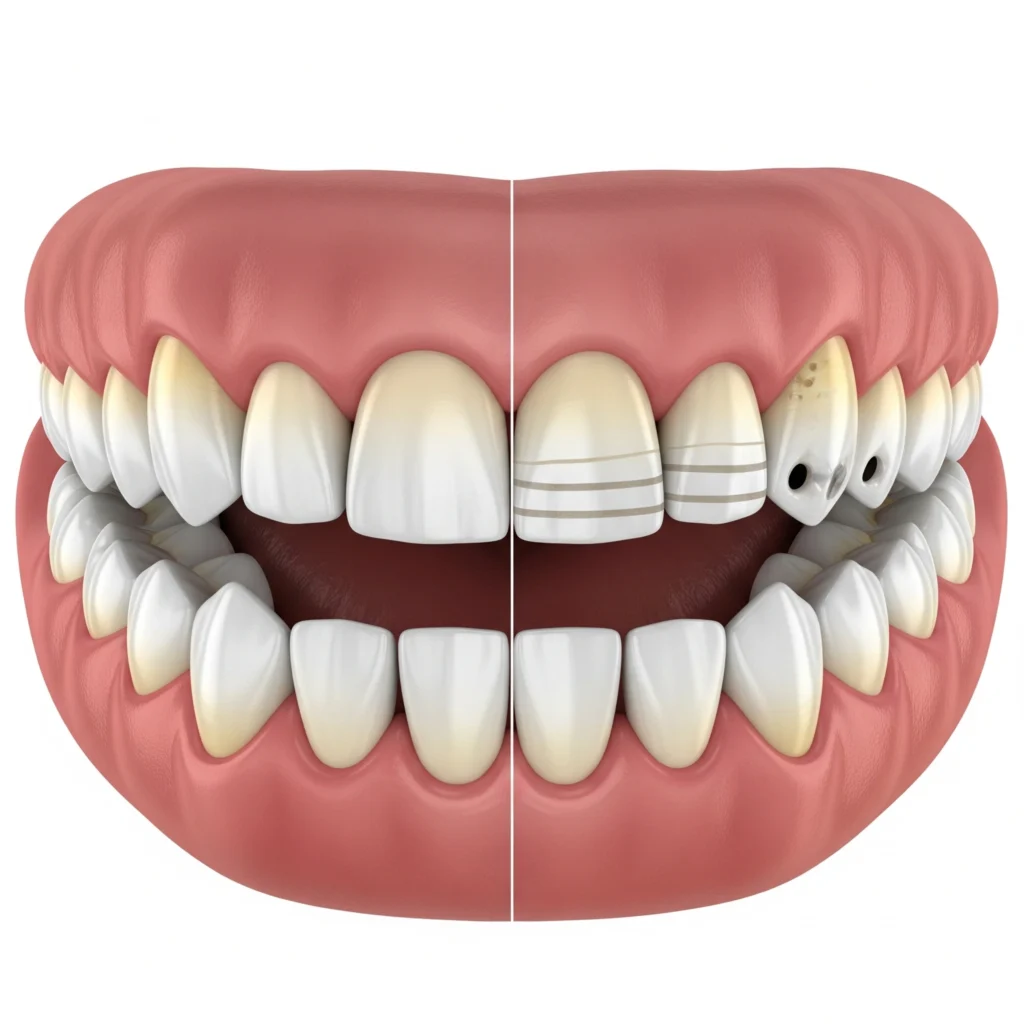Amelogenesis Imperfecta is a rare genetic condition that affects the development of tooth enamel, leading to a range of visible and functional dental issues. As one of the most commonly identified genetic enamel disorders, it can significantly impact a person’s oral health, confidence, and overall well-being.
Amelogenesis Imperfecta is a genetic disorder that disrupts the normal development of tooth enamel, impacting both baby and adult teeth. Unlike normal enamel, which is hard and protective, the enamel formed in people with this condition is either too soft, too thin, discolored, or brittle.
There are different types of enamel hypoplasia, and Amelogenesis Imperfecta is one of the more severe forms. The condition can vary in presentation but always stems from abnormalities in the genes responsible for enamel formation.

The primary cause of Amelogenesis Imperfecta is a mutation in one or more genes involved in enamel production. These genetic changes are often inherited in an autosomal dominant, autosomal recessive, or X-linked pattern.
Several genetic mutations have been identified as contributing factors to the development of this enamel disorder.
AMELX
ENAM
MMP20
KLK4
Since it’s a genetic enamel disorder, a family history of the condition increases the risk. However, new mutations can also cause it in individuals with no previous family history.
Symptoms of Amelogenesis Imperfecta may vary depending on the type and severity but usually include:
Discolored Teeth: Teeth may appear yellow, brown, or gray.
Enamel irregularities: can appear as thinning, surface roughness, pits, or complete absence in severe cases.
Tooth Sensitivity: Due to weak enamel, teeth become sensitive to temperature changes.
Rapid Tooth Wear: The teeth may wear down quickly, leading to functional problems.
Chipping or Breaking: Enamel that is too soft or brittle can fracture easily.
Malocclusion: Teeth may not align properly, leading to bite issues.
These symptoms are often visible early in life, making early diagnosis crucial for effective treatment.
Understanding the specific type of tooth enamel defect helps determine the most effective treatment. The condition is generally categorized into four major types:
Hypoplastic Type: Enamel is hard but thin due to insufficient formation.
Hypomaturation Type: Enamel has a normal thickness but is softer than usual.
Hypocalcified Type: Enamel is poorly mineralized, leading to soft and easily worn teeth.
Hypomaturation-Hypoplastic Type: A combination of soft and thin enamel.
Each type affects the teeth differently and may require a tailored approach to management.
While Amelogenesis Imperfecta cannot be cured, modern dentistry offers a variety of treatments to restore function and appearance. The choice of treatment is guided by the extent of enamel damage and the patient’s developmental stage.
Frequent dental checkups are essential to track enamel wear, identify new issues early, and adjust treatments accordingly.
Children and adults with Amelogenesis Imperfecta often face physical discomfort and emotional challenges. However, with the right support and dental care, most can lead a normal, healthy life. Building a strong relationship with a trusted dental professional can make all the difference.
Encouraging words, regular dental routines, and early intervention not only protect the teeth but also build self-esteem.
Amelogenesis Imperfecta may seem overwhelming at first, but with the right support and advanced dental care, managing the condition becomes entirely achievable. Early diagnosis, personalized treatment plans, and ongoing oral care are key to preserving both function and aesthetics. For families seeking expert guidance and compassionate treatment, the best dental clinic in Kukatpally offers trusted solutions that restore not just teeth, but confidence—one smile at a time.
🦷 Need expert help with tooth enamel defects? Visit Unidental, where our experienced team offers personalized solutions for all types of genetic enamel disorders, including Amelogenesis Imperfecta. Schedule your consultation today!
No. Since it is a genetic condition, it cannot be prevented. However, early detection and treatment significantly reduce long-term complications.
Yes. Both primary and permanent teeth are usually affected. Early intervention during childhood can help manage symptoms effectively.
Not necessarily. With proper care, restorations, and monitoring, many patients retain their natural teeth well into adulthood.
Standard whitening procedures are usually ineffective due to the internal dentin defect. Cosmetic solutions like crowns or veneers are more appropriate.
Without treatment, patients may experience frequent fractures, infections, and functional impairments. Proper dental care can help avoid these issues.
Hyderabad : +91 6305 971445
Anantapur: +91 70758 90089
Goa: +91 83266 32500
Mon to Sat 10:00AM to 8:00PM
Sun 10:00AM to 12:00PM

Our goal is to provide friendly, caring dentistry with the highest standards in general, cosmetic, and specialist treatments. We strive to be the best dental hospital for comprehensive oral care.
We use advanced dental technology to deliver safe, precise, and painless treatments for every patient.